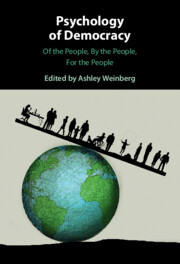Book contents
- Psychology of Democracy
- Psychology of Democracy
- Copyright page
- Contents
- Figures
- Tables
- Contributors
- Preface
- Acknowledgements
- Chapter 1 Psychology of Democracy
- Part I Of the People
- Part II By the People
- Chapter 8 Trust in Political Institutions and Support for Authoritarianism
- Chapter 9 New Technology, Language and Gesture in Contemporary Indian Political Discourse
- Chapter 10 Fact or Fiction
- Chapter 11 Dissecting the Psychology of a Voter
- Chapter 12 Building Trust through a Revolving Door of Leaders:
- Chapter 13 After the Party Is Over
- Part III For the People
- Index
- References
Chapter 8 - Trust in Political Institutions and Support for Authoritarianism
Latin American Students – Does Civic Knowledge Make a Difference?
from Part II - By the People
Published online by Cambridge University Press: 24 February 2022
- Psychology of Democracy
- Psychology of Democracy
- Copyright page
- Contents
- Figures
- Tables
- Contributors
- Preface
- Acknowledgements
- Chapter 1 Psychology of Democracy
- Part I Of the People
- Part II By the People
- Chapter 8 Trust in Political Institutions and Support for Authoritarianism
- Chapter 9 New Technology, Language and Gesture in Contemporary Indian Political Discourse
- Chapter 10 Fact or Fiction
- Chapter 11 Dissecting the Psychology of a Voter
- Chapter 12 Building Trust through a Revolving Door of Leaders:
- Chapter 13 After the Party Is Over
- Part III For the People
- Index
- References
Summary
Trust in political institutions represents a central component of democratic systems. When citizens lack confidence in state bodies, such as the government and parliament, the legitimacy of democracy is dangerously challenged. In the case of Latin America, we observe a critical scenario, with a steady decrease of institutional trust in the last decade, accompanied by alarming levels of support for authoritarian regimes. Most of the previous evidence in this regard refers to the adult population and omits the young generation who certainly have a stake in the future of democracy in the region. Focusing on the role of the acquisition of civic knowledge at school as a protective factor for democracy, we analyse the role of civic knowledge to understand trust in civic institutions and authoritarian attitudes among fourteen-year-old students. The data correspond to the International Civic and Citizenship Education Study (ICCS) of 2009 and 2016, in which seven Latin American countries participated. The results indicate the puzzling role of civic knowledge, as it diminishes trust in institutions, yet at the same time reduces authoritarian beliefs. The consequences for democracy and citizenship education are addressed.
Keywords
- Type
- Chapter
- Information
- Psychology of DemocracyOf the People, By the People, For the People, pp. 173 - 194Publisher: Cambridge University PressPrint publication year: 2022

